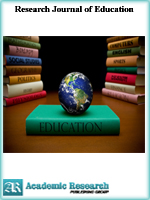Research Journal of Education
Online ISSN: 2413-0540
Print ISSN: 2413-8886
Print ISSN: 2413-8886
Quarterly Published (4 Issues Per Year)

Archives
Volume 3 Number 11 November 2017
The Impact of Using the 5E Learning Cycle on the Development of Habits of Mind and Critical Thinking Skills for the Primary Stage Students in Jordan
Authors: Jamal Khalil Alkhaldi
Pages: 164-172
Abstract
This study aims to detect the impact of the modified learning cycle strategy on the development of habits of mind and skills of critical thinking in the ‘Islamic Education’ subject for 10th grade students in Jordan. To achieve this goal, the researcher used the semi-experimental approach, hence dividing the students into two groups: a control group and an experimental group. Each grouped consisted of (31) students. The modified learning cycle was applied to teach the experimental group, and the regular traditional strategy to the control group. The researcher prepared two studying tools: a measure of the habits of mind which consisted of (25) paragraph, and a critical thinking skills test which included (28) paragraph. Both tools were applied after assuring their validity and reliability. The results indicated a statistically significant difference for using the modified learning cycle strategy in the development of habits of mind and skills of critical thinking for the experimental group students compared to the control group students. The study, thus, stresses the need to apply the modified learning cycle in teaching the ‘Islamic Education’ subject due to its effectiveness in developing habits of mind and skills of critical thinking. The researcher also recommends conducting more research on the effectiveness of the modified learning cycle that concentrates on different variables.
The Concept of Teacher,s Personality in Shaping Student,s Characters
Authors: Norsidah Ahmad ; Mohd Khairy Kamarudin ; Kamarul Azmi Jasmi
Pages: 157-163
Abstract
The personality of teachers is very essential in developing students’ characters. However, the concept of teachers’ personality is a subjective concept. This study aims to recommend the concept of teachers’ personality in nurturing student characters through a literature review analysis. This study indicates that there are six key elements in the teachers’ personality; they are application of affection values, role model of noble akhlak, mastery of knowledge, self-motivation, leadership skills and sincerity. Each element has its own roles in ensuring that teachers are able to improve the students’ personality. The effects of high personality can also give students a deep understanding of what is being taught and it can attract students and teachers to interact easily with each other.
Challenges in Leading and Managing People in Institutions of Learning in Cameroon
Authors: Agbor Michael Ntui
Pages: 150-156
Abstract
Challenges in leading and managing people in educational institutions are worthwhile indicators that require constant checks and adjustments. These verifications are necessary because humans are complex beings and whose thinking faculties are not fixed and often guided by situational and environmental factors. Consequently, they must have divergent views which may pose unpredictable problems to administrators. Only very smart and ardent leaders maybe quick to detect, withstand and overcome such inevitables. The need for such challenges to be identified and controlled before they galvanize subordinates into negative behavioral tendencies cannot be under-estimated. This paper therefore examined possible challenges which may manifest as impediments or hindrances to the effective leading and managing of people in educational institutions in Cameroon. A number of challenges were examined and discussed in the paper. Suggestions for ways of checking and controlling the challenges have been made to serve as a reservoir of checks and guides for school administrators and leaders. The paper cautions school managers to be tactful and apply modern charismatic approaches in the control, directing of staff and managing of their institutions.
School Safety
Authors: Hamilton-Ekeke, Joy-Telu
Pages: 143-149
Abstract
This paper reviews studies on school safety and safety precautionary measures in schools to safe guard the lives and properties in the school environment. To this end, the review is done under the following headings: theoretical framework; concept of safe school; relevance of the concept of safe school to health education; empirical evidences of studies on school safety. The primary responsibility of every Local Education Authority (LEA) is to ensure a safe and secure environment for students, staff and visitors. Specific actions that schools can take to increase school safety include ways to identify possible warning signs of students-at-risk and provide support to such students who do not feel that they belong in the school community. Working together, schools and community partners can focus their emergency planning using national guidance, including efforts to build a positive school climate to establish relations of trust and respect among students and staff in order to encourage them to share information about threatening behavior before an incident occurs. Students who do not feel safe at school stay home, and when students are not in school, they do not perform academically; it is therefore recommended that students’ perception of safe school is vital for progress in the entire educational endeavour.



